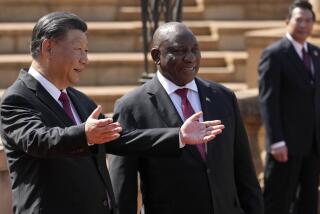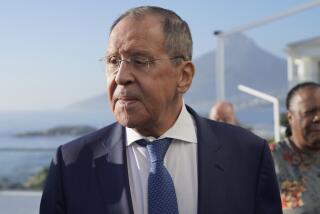Few Gains Expected in Meeting of Key Commonwealth Leaders
- Share via
LONDON — Leaders from seven Commonwealth nations convene here Sunday for a three-day review of possible action against the white-minority regime in South Africa, but stiff British resistance to such moves is likely to block any package of tough new measures.
Although the Commonwealth “minisummit” was once seen as a pivotal meeting in which Britain would probably be forced to agree to further sanctions, it now appears that Prime Minister Margaret Thatcher has decided to bypass the meeting and, instead, coordinate limited additional measures against the Pretoria government with the United States and other Western countries.
No specific action is expected by these countries before late September.
Consultations for such coordinated action stem from the recent failure of British Foreign Secretary Geoffrey Howe’s personal diplomatic efforts to coax South Africa’s white leadership to enter talks with black nationalists over the dismantling of the system of apartheid.
Facing Pressures
The consultations here unfold as both Thatcher and President Reagan face stiff pressures to implement new measures.
For Thatcher, much of the pressure comes from the Commonwealth, a grouping of Britain and the 48 other nations that once formed the bulk of Britain’s colonial empire. Of the seven leaders attending the summit, only Thatcher opposes implementing immediate, sweeping sanctions against the South African government. But her stand alone is likely to block all but token measures.
The prospect that, despite strong opposition to Thatcher’s position there will be no major action, reflects a simple reality: In the Commonwealth, Britain carries most of the weight.
As the single largest foreign investor in South Africa and one of Pretoria’s largest trading partners, Britain alone among the seven is capable of exerting real pressure on the government of President Pieter W. Botha.
2 Dependent on Pretoria
Two of the countries represented here--Zimbabwe and Zambia--are undeveloped, landlocked nations, heavily dependent on South Africa as a lifeline. The other four--India, Australia, Canada and the Bahamas--maintain only marginal trade relations with Pretoria.
Canada’s recent decision to cut airline flights to South Africa, for example, reportedly affected only a few charter flights a week.
In briefings this week, senior British government officials have presented a position so unyielding that many London observers believe the biggest question about the minisummit is no longer whether Thatcher will prevent further Commonwealth action, but how she will block it without causing a politically embarrassing split with the other six.
Some officials have indicated that she may offer a commitment to future action that would be linked with moves by other industrial nations.
But emotions among many Commonwealth leaders are running high.
Will Be ‘Very Difficult’
“We’re not looking for a breakup of the meeting and blood on the carpet, but the prime minister has made it abundantly clear how little room for movement there is,” a British Foreign Office official said. “It will be a very difficult conference.”
When Howe arrived in Lusaka last week, Zambian President Kenneth D. Kaunda publicly declared him “not welcome at all.”
Earlier, Kaunda had threatened to withdraw from the Commonwealth, while other leaders, including Prime Ministers Rajiv Gandhi of India and Robert Mugabe of Zimbabwe, have talked of imposing sanctions against Britain if Thatcher fails to go along with tough new measures against South Africa.
Although not officially representing any of the seven minisummit nations, former Australian Prime Minister Malcolm Fraser seemed to capture the mood of those leaders pressing for additional sanctions when he declared Friday, “The continued use of words has become demeaning.”
Fraser was co-chairman of the Commonwealth’s so-called Eminent Persons Group that met both black and white South African leaders before issuing a report in June that called comprehensive sanctions the only way to force South Africa into negotiations to end apartheid.
May Avert Open Break
Still, there were hints that the serious differences at the minisummit will stop short of an open break. In New Delhi, Gandhi stressed in a British Broadcasting Corp. interview Friday that additional action is important, but he emphasized that he does not want to break up the Commonwealth.
Instead, Gandhi suggested that failure of the minisummit to agree to further measures might lead to an emergency summit of all 49 Commonwealth leaders, possibly late next month.
With about $750 million in British foreign aid allotted to Commonwealth countries, there is also a financial incentive for African nations in the Commonwealth to remain in it.
“A number of Commonwealth leaders have written to me saying basically that if nothing concrete can come from (this) summit, then they would like a heads of government meeting called,” Gandhi said. “If there is a problem (reaching agreement), then it’s not for just the seven nations to come to a conclusion. For this, it will probably need all 49 heads.”
But there are also pressures working on Thatcher to moderate her stand and concede what one of her aides called “a gesture or two.”
Thatcher’s Tone Disliked
The tone as much as the substance of her opposition to extensive sanctions has generated opposition to her policies within her own Conservative Party that reportedly extend into her Cabinet.
A moderate faction of the party issued a statement Friday calling for “substantial sanctions.” In addition, Howe and party chairman Norman Tebbit, both considered to be in the Tory right wing, have admitted the probable need for additional measures.
A public opinion poll published Friday indicated that public sentiment is shifting against Thatcher on South Africa.
She was openly booed by anti-apartheid demonstrators, who pelted her car with tomatoes and eggs as she arrived at the Commonwealth Games in Edinburgh.
Earlier, the Edinburgh City Council voted to withdraw a social invitation extended to her, reflecting its belief that her policies were responsible for the withdrawal of 31 countries from the games.
Her response to the protest was to remain at the games an hour longer than scheduled.
Changed Rhetoric
In the face of mounting Commonwealth anger and press reports of concern on the part of Queen Elizabeth II, Thatcher did change her rhetoric last month, emphasizing for the first time that some additional measures might be needed against South Africa.
While she had grudgingly acknowledged this possibility in the past as a way of preserving political unity among opponents of apartheid, she had rarely spoken of it, preferring instead to emphasize her message that sanctions do not work.
While pressure may eventually force her to take additional action, the Commonwealth minisummit seems unlikely to be the place.
Officially, the seven leaders are meeting to review a list of eight specific measures that last October’s Commonwealth summit in Nassau agreed to consider if the Eminent Persons Group failed to move South Africa toward negotiations.
The measures would be in addition to nine already agreed upon at Nassau, including bans on oil exports and new government loans to Pretoria.
The proposed additional sanctions include bans on air links with South Africa, on the import of agricultural products, on new investments and on the promotion of tourism to South Africa.
But British officials have said that their commitment is only to “consider” these possibilities and, except for possible token gestures, they predict that little action will come from the meeting that starts Sunday.
After Consultations
Officials at the Foreign Office and at Thatcher’s offices in Downing Street note that any additional British measures against South Africa are likely to come only after consultations with the United States and a review of South Africa policy by the 12 European Communities nations scheduled for late next month.
The 12 European nations have already discussed possible bans on iron, steel, coal and uranium imports from South Africa.
More to Read
Sign up for Essential California
The most important California stories and recommendations in your inbox every morning.
You may occasionally receive promotional content from the Los Angeles Times.













